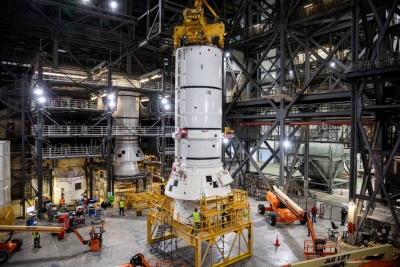NASA's Artemis 1 moon mission rocket delayed till March
By IANS | Published: February 3, 2022 12:30 PM2022-02-03T12:30:02+5:302022-02-03T12:35:17+5:30
Washington, Feb 3 NASA's much awaited 'Artemis 1' mission, that aims to return humans to the Moon, has ...

NASA's Artemis 1 moon mission rocket delayed till March
Washington, Feb 3 NASA's much awaited 'Artemis 1' mission, that aims to return humans to the Moon, has been delayed until March.
It was earlier scheduled for launch in February.
In a statement on Wednesday, NASA announced that the 'Space Launch System' rocket and Orion spacecraft will not be rolled out to Launch Pad 39B at the Kennedy Space Center in Florida for testing "no earlier than March 2022".
"While the teams are not working on any major issues, NASA has added additional time to complete closeout activities inside the Vehicle Assembly building prior to rolling the integrated rocket and spacecraft out for the first time," the US space agency said.
The space agency has not yet announced a new date for rollout.
"Right now, we're kind of looking at mid-March," Space.com quoted Tom Whitmeyer, the Deputy associate administrator for exploration systems development at NASA headquarters in Washington D.C, as saying during a press conference.
"We'll get a little bit closer to the final close-out and then we'll be in a better position to target a specific date."
Once the rollout to the pad is successfully completed, the next step toward launch will be a wet dress rehearsal.
"The engineers will continue work associated with final closeout tasks and flight termination system testing ahead of the wet dress rehearsal," NASA said.
The space agency added that it is also reviewing launch opportunities in April and May.
'Artemis 1' will be the first of NASA's Artemis missions, which the agency plans will eventually land humans back on the moon as part of a long-term goal for a sustainable lunar presence. This will be the first time that NASA or anyone else will send humans to the moon's surface since the agency's last Apollo mission in 1972.
This first mission will be uncrewed and will see the Orion spacecraft go far past the moon before returning to Earth and testing the technology that will one day soon carry humans.
Disclaimer: This post has been auto-published from an agency feed without any modifications to the text and has not been reviewed by an editor
Open in app